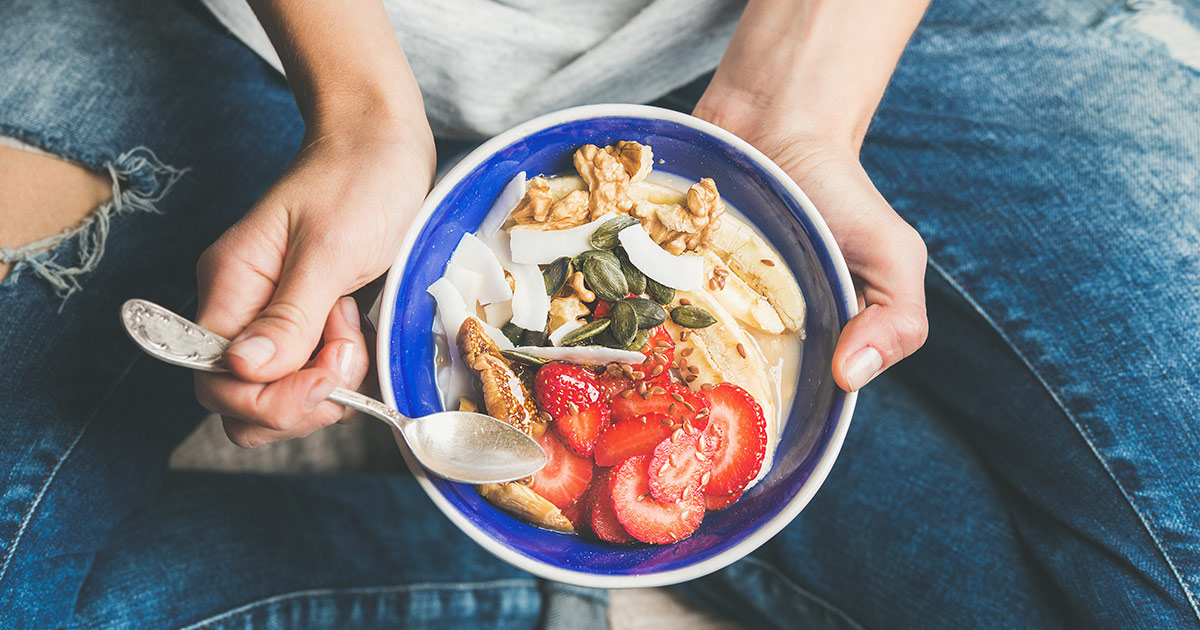
As a teacher, you’ve seen first-hand how diet and nutrition can affect your students. But it’s time to turn the lens back on yourself. Eating right goes beyond whittling your waistline and even improving your physical health. It all comes down to how foods affect the brain. Healthy food = happy mood. And some nutrients have a more significant impact than others. The trick is learning to eat for your body AND your brain and then planning ahead so you’re prepared with healthy foods when your schedule explodes.
Let’s take a look at some of the best mood-boosting nutrients available and run through some quick and simple snack ideas for each.
Protein. We already know it is a crucial building block of bones, muscles, cartilage, skin, and blood. But upping the protein in your meals can slow the absorption of carbohydrates in your blood and trigger the release of dopamine and norepinephrine which can boost your mood and skyrocket your energy levels.
Simple snacks
- Hard-boiled eggs
- Deli meat roll-ups
- Cheese cubes
- Steamed edamame
- Raw almonds
- Tofu cubes
- Plain Greek yogurt
Vitamin D is another great bone builder, Vitamin D also improves brain health, memory, circulation, and mood. Vitamin D deficiency is often linked with mood challenges and even depression. If you can spend time in the sun, great. But when your hectic schedule keeps you indoors, nosh on some foods that pack a powerful Vitamin D punch.
Simple snacks
- Low-fat milk
- Hard-boiled eggs (with yolk), egg salad
- Mushrooms
- Smoked salmon
- Oatmeal
- Fortified dried cereals
- Tuna salad
Folate (B9) helps the body create new cells and supports serotonin regulation (which affects mood and even social behavior). When paired with B12, which creates red blood cells and nerves, the two become incredibly powerful and are commonly used together to treat depression. Pairing foods from these two groups will give you the biggest bang for your bite.
Simple snacks
- Spinach salad (B9) with shredded mozzarella or cottage cheese (B12)
- Dried fortified cereal (B9) with fortified soy milk (B12)
- Chickpeas (B9) with some cubed Swiss cheese (B12)
- Tuna salad (B12)-filled avocados (B9)
Chromium is a trace mineral found in the body that helps metabolize food and allows the regulation of insulin. It also increases brain levels of three major mood regulators — serotonin, norepinephrine, and melatonin.
Simple snacks
- Broccoli
- Grape juice
- Whole-wheat English muffin
- Sliced turkey breast
- Mashed potatoes
Vitamin B6 is significant to protein, fat, and carbohydrate metabolism and the creation of red blood cells and serotonin, norepinephrine, and melatonin, making it another powerful antidepressant. It can also help to decrease high blood levels of the amino acid homocysteine, which is linked to depression and other psychiatric issues. Interestingly, your body cannot produce vitamin B6, so you have to get it from food or supplements.
Simple snacks
- Carrots
- Spinach
- Sweet potatoes
- Green peas
- Lentils
- Bananas
Fiber can slow the absorption of sugar into your bloodstream and increase serotonin — both of which can prevent mood swings. Fiber also has the ability to alter gut microbiota to reduce inflammation and oxidative stress, And because 90% of serotonin is actually produced in your gut, this is can significantly aid in combating anxiety and depression.
Simple snack ideas
- Oatmeal
- Beans
- Pears
- Brussels sprouts
- Artichokes
- Raspberries
- Avocados
- Prunes
- Brown rice
Vitamin C. From scurvy prevention to immune system support, Vitamin C has long been touted for its incredible health benefits. But did you know it’s also essential to your body’s ability to make critical neurotransmitters including dopamine, noradrenaline, and serotonin? Turns out, it is extremely effective at stabilizing mood and preventing depression.
Simple snack ideas
- Oranges
- Water with lemon
- Strawberries
- Red bell peppers
- Broccoli
There’s a clear relationship between the foods you put in your body and your state of mind. Stay away from refined carbs like white bread, sugar, and crackers, which will set you on an emotional roller coaster, and opt instead for fresh, organic produce and pasture-raised protein. The summer is the perfect time to solidify these habits. Hit up your local farmers market — it’s fun and it will get you in a healthful spirit!
And be proactive about your mood by planning ahead and making sure your fridge (and school bag) are stocked with as many mood-elevating snacks as possible. No reaching for a pre-packaged box o’ junk just because you’re in a pinch. A little forethought can go a long way in saving the day!
Categorized as: Educator Rejuvenation
Tagged as: Summer Rejuvenation Challenge, Teacher Self-Care
